Marc Lynch's Blog, page 103
January 17, 2013
Debating Syria
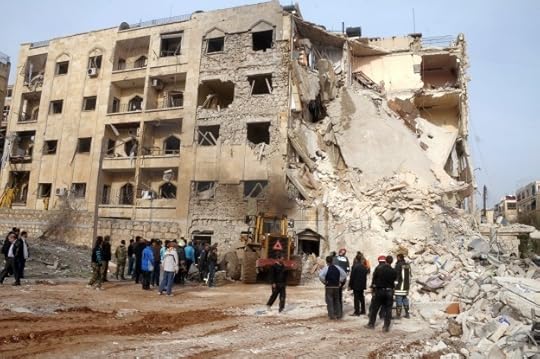
I'm in Riyadh for the week (where I've been hearing a lot of support for arming the Syrian opposition and an intensely sectarian Sunni-Shi'ia framing of the conflict -- but more on all that next week). But the FP column I filed before I left on intervention in Syria came out yesterday and I wanted to just quickly make a few comments on it and some of the responses I've received here.
The column looks back at the failure to achieve a negotiated political solution to the crisis, and some of the flawed assumptions (including my own) which might have contributed to that failure. It is not a happy column -- how could it be amidst Syria's devastation? The failure of Annan's diplomacy does not mean that it should not have been tried, though, for reasons I outline in the column. But some of the people discussing the column slightly missed the point when they suggested that I'm still supporting the Annan/Brahimi approach. Actually, what I tried to argue was that the conditions which made it worth attempting last year have mostly disappeared. It's too late to avoid the militarization of the conflict or to
prevent the sidelining of non-armed groups. There's no diplomatic
process or international consensus to save. It's hard to imagine the
"soft landing" for which that political track so desperately -- and correctly -- strove. There's no going back.
The last year should be a lesson to those who called for arming the rebels, too. The shift to armed insurgency in the face of Assad's brutality and refusal of genuine political change has produced catastrophic results. The poorly coordinated funneling of weapons and money to armed groups by various external players has produced greater bloodshed, the
eclipsing of non-violent protest leaders, fragmentation into
competing emergent warlords, the creation of an attractive open field for jihadist groups to exploit, the retreat of the uncertain middle ground
into hardened camps, and the greater likelihood of post-Assad chaos. The problem is not that the U.S. or other outside powers didn't provide enough weapons, it is intrinsic to the nature and logic of such an armed insurgency. [[BREAK]]
More broadly, if political negotiation backers too easily assumed that levers could be found to push Assad from power, intervention advocates too easily assume that a military intervention would have made Syria today look substantially better. They refuse to consider the very plausible possibility that such a Syria would be just as violent and militarized, that al-Qaeda affiliated Islamists would be just as active, and that Assad would be just as entrenched and with far more robust domestic, regional and foreign backing. And they rarely consider one of the major risks identified by most of those opposed to limited intervention, that the United States would now be deeply enmeshed in an inescapable and escalating quagmire.
The last year have to impose greater analytical humility on everyone, myself very much included. There may have been a solid logic behind the political track which I supported, but it didn't work and massive suffering has followed. I've heard enough confident predictions of Assad's impending demise to last a lifetime, and wish that we as an analytical and policy community could have done better in supporting that political process and finding the levers to force a political transition.
A lot of people are trying hard to come up with good ideas. Along with my piece, I'd recommend having a look at a number of strong proposals for more direct intervention this week, by Andrew Tabler, Fred Hof, and Salman al-Shaikh and Michael Doran. Their pieces offer up a range of ways to speed up Assad's fall short of direct military intervention, with a range of ideas from arming the opposition, trying to organize the opposition, disabling the regime's air power, and more. I see serious problems with a number of these proposals and find some intriguing, but given the horrifying conditions of Syria today and the absence of real diplomatic options, it's worth giving them all careful thought. I hope you'll read my piece, read theirs, and contribute to a serious debate about what realistically can be done.
January 14, 2013
Tunisia's terrible twos
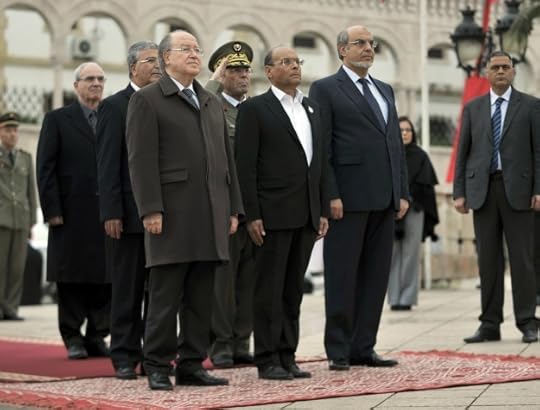
Today is the second anniversary of the flight of former Tunisian President Zine el-Abedine Ben Ali. But the new Tunisian republic's second birthday is not an especially happy one. A year ago, Tunisia was widely seen as the one Arab transitional country getting things right. But today, there's much less optimism. The economy continues to struggle, the constitution and elections remain unresolved, Islamist-secular polarization has intensified, and many complain about the over-reach of the ruling Ennahda party. Despair over Tunisia's fate has become as fashionable now as optimism was last year. And as for Egypt... well, Egypt.
How surprised should we really be with these travails, though? As I tried to persuade Nervana Mahmoud over Twitter this weekend,
looking more broadly at other non-Arab cases might help. Comparison only gets you part of the way, of course -- no, theory doesn't let you get away with not knowing your cases inside and out! But at the least, a longer and
wider comparative lens can help to show which parts of a country's
political struggles are unique, demanding explanation in purely local
terms, and which are common across many similar cases and therefore
don't.
Studying politics long enough usually somewhat lowers expectations about the virtues of democratic politics. Democracy is usually ugly, messy, frustrating, and alienating -- even
fully consolidated ones. Politicians don't often set aside
their self-interest for the greater good. Old elites generally don't
just give up and walk away. Opposition forces struggle for unity. The
media rarely avoids profitable sensationalism in the interest of
rational public discourse. Intense competition with high stakes and
uncertain results tends to drive mistrust, competition and fear.
Elections don't usually bring out the best in the political class. Constitutional drafters disappoint. None of that means that democracy isn't worth pursuing -- quite the contrary! -- but a dose of realism can help innoculate against stampedes towards despair.
And so yes, Egypt and Tunisia do look pretty bleak two years into their revolutions... but that's pretty much what the comparative cases would predict. Transitions from authoritarian rule are hard! Skepticism bordering on despair for democracy, polarization, fragmented oppositions, economic struggles, controverisal constitutions as democratic revolutions enter their second year.... well, let's just put it this way. There's a reason that "the terrible twos" are sort of a cliche. [[BREAK]]
For example, here's a 1992 Journal of Democracy article entitled "Eastern Europe's Terrible Twos." It begins:
"the birth of democracy in Eastern Europe two years ago was an occasion of unparalleled joy and hope... more recently, however, our glow has given way to gnashing of teeth. The infant democracy has reached a stage that all parents recognized -- what the baby books call the 'terrible twos.' It is a time of testing limits. The Czechs and Slovaks are consumed with sibling rivalry... Bulgaria's democratic opposition, which lost to the communists in the 1990 election, decided to prepare for the 1991 election by splitting into five factions. In Poland, the democratic movement Solidarity broke into more pieces than anyone has been able to count... in Bulgaria, Romania, Albania, Serbia and Montenegro the Communists were able to win early elections by virtue of their vast organizational advantages and mastery of dirty tricks, including intimidation, fraud, abuse of office, and monopoly control of the media... In each of the four countries where the communists have been beaten.. the break-up of the democratic front and the onset of postcommunist politics quickly ensued."
Sound familiar? Later in 1992, two years in to the great early wave of democratic transitions in Africa, Rene Lemarchand fretted in the Journal of Democracy that
"the initial burst of popular enthusiasm ignited by the flame of democratization is giving way to a growing realization among Africans that, as one wag put it, 'at the end of the light is the tunnel.'" Widespread evidence of political liberalization notwithstanding, there are compelling reasons to fear that the movement towards democracy may contain within itself the seeds of its own undoing... It is one thing for an urban mob, a guerrilla army, or a national conference to topple a dictator; the construction of a democratic polity is an altogether different and far more arduous undertaking... One prominent concern centers on the inability of opposition forces to achieve internal unity."
And then there's the "colour revolutions" in Georgia (2003), Ukraine (2004) and Kyrgyzstan (2005), none of which were looking particularly hopeful two years after the dizzying excitement of successful popular uprisings for democracy. In Georgia,
Mikail Saakashivli won the post-revolutionary Presidential election effectively unopposed with 96%
of the vote, and his party won 67% of the seats in the Parliamentary election with no other party breaking 8% (MB: amateurs!). But the mood soon soured, and by 2007 protestors were back in the streets complaining of corruption, police were cracking down violently, and the President declared a state of emergency. Two
years after Ukraine's Orange Revolution brought Viktor Yuschenko to
power, it had become clear that democratic change had failed to overcome the country's deep, persistent and entrenched polarization. Two years on it was hard to conclude that Kyrgyzstan had ever really had a chance.
There is no single, obvious lesson to be drawn from all of this beyond the fairly obvious point that two years on almost every transition from authoritarian rule has been deep in the doldrums. Some of those troubled transitional countries rallied and over time consolidated genuine democracies, others slouched back into semi-authoritarian or gangster regimes. I don't mean to minimize the real challenges and possibility of failure in Egypt, Tunisia, Libya or Yemen -- the point is just that deep, profound disenchantment with the fruits of revolution two years on is not a very good predictor of which way they will ultimately go.
January 11, 2013
Right-Sizing America's Mideast Role

In case you missed it, my debut FP column came out yesterday calling for the "right-sizing" of America's Middle East strategy. Basically, it argues that President Obama has done some really good things over the last four years, like getting out of Iraq, and has done a good job at avoiding the worst outcomes -- yes, even in
Syria, where we could easily have just as terrible a civil war but with
significant American military involvement. But as he gears up for his second term, this is the time for the new Obama team to take a step back and think about its longer-term goals for the Middle East. He has his four more years: what does he want to do with them in the Middle East? How are his policies helping to achieve those goals?
Basically, I argue that Obama does have a Middle East strategy shaped by an accurate assessment of the nature of the Arab uprisings and laid out very well in his mostly-forgotten May 2011 speech. But that vision is too easily forgotten in the daily grind of crisis management and the inevitable compromises of tough policy choices, and needs to be adapted to the dramatic changes in the year and a half since his last major Middle East policy address. The column, partly based on a longer article which I wrote with Colin Kahl which will be published in a few months, tries to lay out the logic of "right-sizing" --- not "disengagement" and not "retrenchment", but systematically changing the expectations and the reality of America's military and political role in regional affairs while pushing to build a new regional architecture based upon more democratic and independent allies in key countries like Egypt and Libya as the foundations.
I hope you'll read the whole column over on the main FP page. I'll try to respond to comments and questions when possible over here. My next column is going to focus on one of the main strategic challenges, and arguably failures, of the first term.. but you'll just have to wait to see which one!
The Battle for Egypt's Constitution
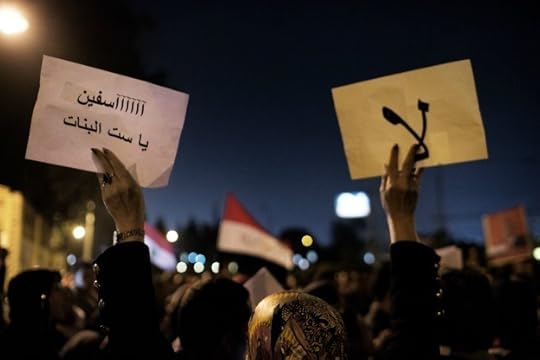
The Middle East Channel Editor's Blog
On December 26, Egyptian President Mohamed Morsi signed
off on a new constitution. It was
not a cheerful occasion for many politically active Egyptians, following one of
the most intensely, dangerously polarized months in recent Egyptian
history. The bitterly
controversial two-round referendum approving the constitution revealed the
depth of the political and social chasm which had been torn through the
political class. I offered my own thoughts on the meaning of these events late last month in my "Requiem for Calvinball," but that was only one part of the wide range of coverage on the Middle East Channel of coverage of the crisis. So I'm pleased to announce here the release of POMEPS Briefing #17: The Battle for Egypt's Constitution, collecting our articles on the constitution and the
political landscape left in the wake of this explosive crisis.[[BREAK]]
The
constitutional drafting process, as Nathan Brown pointed out just before the
explosion of the crisis, had been a shambolic mess for over a year and little resembled academic conceptions of how a constitutional process should unfold. There was little high-minded public discourse here, little search for wide national consensus, little attempt to reach beyond political interest to seek a higher dimension of political agreement. Rebuilding a ship at sea, in Jon Elster's endlessly evocative phrase, never looked so perilous. Complaints about Islamist
domination of the constituent assembly had led to mass resignations by
non-Islamist members and excoriating commentary in the Egyptian public sphere. Backroom battles over the powers of
state institutions intersected with principled arguments over matters such as
the role of Islam and public freedoms. This was not the heady stuff of the great constitutional assemblies
celebrated in the history textbooks -- even before the surreal, late-night, non-deliberative ratification
process.
Those byzantine battles might have continued indefinitely
had Morsi not seen the opportunity to act more forcefully. His diplomatic success in
brokering a ceasefire between Israel and Hamas (see Brumberg's essay, and mine)
brought him unprecedented international acclaim, and perhaps emboldened him to
press his advantage at home. He
first issued a presidential decree of breathtaking scope (see Revkin's essay),
which in principle (though of course not in in reality) placed him above all oversight and accountability. His brazen power grab succeeded
where almost everything else had failed -- it got Egyptians back out into the
streets protesting. But
those protests quickly turned ugly and violent, revealing intense polarization rather than societal unity, as Muslim Brotherhood
supporters attacked protests and Brotherhood offices were burned to the ground
across the country (see Goldberg's essay).
The diagnosis
of the nature of the crisis is itself controversial. Indeed, as Hamid points
out, the Islamists and their opponents seemed to be living in almost entirely
different conceptual worlds. Was this the unfolding of an Islamist scheme to
consolidate theocratic rule, or the ungainly and poorly executed endgame of a
horribly mismanaged transition? Was it a renewal of the January 25 revolution or the dividing of that
revolutionary unity into two hostile camps? Hanna's essay incisively argues that Morsi and the
Brotherhood appeared to aspire to domination rather than to building a consensual
political system, taking their electoral victory as a mandate for majoritarian politics. I
pointed to the greater analytical significance of the absence of any institutional constraints, which made the fears of
such alleged Brotherhood ambitions difficult to contain. With the Brotherhood and Morsi
seeming to repeatedly break their word and escalate the situation, and with
blood in the streets and furious words everywhere, no consensus seemed remotely
possible.
The constitutional referendum set the stage for exceptionally important parliamentary elections, now scheduled for April. For the first time in ages the divided and weak opposition
sees the possibility of pushing back against the Brotherhood through the unification and
mobilization of a new coalition united mainly by fury over the rule of the
Brotherhood (see Hill and Yaqoub). The referendum results, with a strong showing for the opposition in Cairo, low turnout overall, and a failure to reach the symbolic 67 percent threshold, offered some grounds for optimism among the various opposition forces (see Masoud's essay). The renewed political divisions and bickering of the opposition over the
last few weeks are not reassuring in this regard.
Whatever the elections bring, the Brotherhood is now facing more public scrutiny and
political pressure than ever before, and seems unable or unwilling to reach out
to mend the shattered relationships. It has dealt poorly with this new political arena,
struggling to adapt to its new power and responsibilities (see Anani). The
crisis has generated a tremendous wave of antagonism toward the Muslim Brotherhood
among parts of the Egyptian political class Brotherhood's opponents now warn of
the "Brotherhoodization" of all sectors of political and social life. They see Islamists pushing to deepen
their control not only over elected bodies such as the Shura Council and the parliament, but over local government, the
bureaucracy, labor unions (see Bishara), and the media (Mabrouk). That anti-Brotherhood rhetoric can go to such absurd extremes that it sometimes resembles the silliness of Western anti-Islamist conspiracy theorists (two spheres which are regrettably increasingly feeding upon each other). But broadly speaking, the pushback against the Brotherhood and the challenges it faces in governing and its badly dented reputation speak well for a more balanced Egyptian political arena in the coming years.
And what of the constitution itself? It isn't the worst constitution in the
world, but it's not very good (see Hellyer). It is not the blueprint for theocracy or for renewed
dictatorship described by its most extreme critics, but nor does it lay out a
clear and forward leaning political architecture. Its treatment of Islam (see Lombardi and Brown)
potentially opens the door to significant changes in the relationship between
religion and state. More broadly,
the ambiguous wording of the constitution and its frequent references to
important issues being determined through legislation worry those who fear that
such loopholes will be exploited.
Lurking behind this political drama lies Egypt's accelerating
and truly frightening economic collapse. Morsi and the IMF were reportedly close to a deal, but talks
broke down in the face of the political instability (see Wills). Attempts to deal with the cost of subsidies were
quickly withdrawn in the face of the political turbulence, and won't be easy for the Brotherhood to implement (which should be another source of optimism for the opposition). But this isn't just politics. With the Egyptian pound
collapsing, tourism and exports in an abyss, and Qatari loans only a stopgap, the
crisis is acute. Last year, Muslim Brotherhood Deputy Supreme Guide Khairat al-Shater told me that attracting foreign investment and rebalancing the Egyptian economy had to be the country's top priority -- but what rational investor would take a stake in Egypt as it has been for the last two years? Perhaps the
political respite will reassure investors and the IMF, but it seems unlikely
that this polarized political arena will remain calm for long.
Analysis of Egyptian politics over the last year, much like
Egyptian politics itself, has tended toward hyperbole and polarization. It also tends to be too Egyptian-centric, seeing everything there as unique and neglecting the lessons of other difficult transitions from authoritarian rule. Economic struggles, political polarization, resentment at the opportunism of parties which surge into power, dissatisfaction with the fruits of revolution, disappointing constitutions -- these are not unique to Cairo. Analysts should perhaps spend less time trying to decipher the true Islamic inclinations of the Muslim Brotherhood and responding to the daily Egyptian political churn, and more time with the political science transitions literature. And, of course, with POMEPS Brief #17: The Battle for Egypt's Constitution.
January 9, 2013
Abu Aardvark 4.0

Happy New Year! It's been four years since I moved my Abu Aardvark blog over to Foreign Policy as part of a relaunch which has succeeded beyond anyone's projections (thanks Dan, Susan and Blake!). And it's been about two years since I launched the Middle East Channel. So this seems to be time for a change. As Laura Rozen reported last week, I will be joining the admini.... just kidding! [*] No, instead I'm thrilled to announce that tomorrow will be the launch of my new weekly FP column on the Middle East and U.S. policy.
The column will cover the same basic turf as the blog. It may have slightly more emphasis on the Washington dimension, but don't expect any radical changes. I'll still be writing about Arab politics, reporting on developments across the region and offering up my own analysis of the big issues, and working in Jay-Z, Phineas & Ferb and Calvin & Hobbes references as often as possible. I see the new column as an opportunity to make a regular, more formal weekly contribution to the broader foreign policy debate, engaging with a wider audience and set of issues.
Don't worry, though -- Abu Aardvark and the Middle East Channel aren't going anywhere. In fact, for now I see this as something of an Abu Aardvark 4.0 relaunch. Over the last year, mostly because of the time I spend editing the Middle East Channel, Abu Aardvark evolved into one column-length piece a week. I mostly posted shorter pieces, videos, and the release of our Briefs over in the "Middle East Channel Editor's Blog."
At a certain point, though, I began to find this arrangement overly confining. The expectation that every post would be a fully developed analytical column didn't leave much room for the quicker, less formal blogging that I used to do more regularly. So with the launch of my column, you'll still see those longer analysis pieces here, but I plan to also begin using Abu Aardvark again for shorter hits, for discussion and development of the columns, and for more of the kind of material which had been going into the Editor's Blog.
I'm excited about the new column and the chance to return to some old school blogging here. Thanks to everyone for your support, readership, feedback and interest over the last four years (or more than ten, if you count the pre-FP blog) --- I hope that you'll enjoy the new column and blog. Stay tuned for tomorrow's launch!
[*] Actually, while it's flattering to be included in the DC buzz, it's not going to happen. Yes, I advised the Obama campaign in 2008 and 2012, but it wasn't to get a job. I've just agreed to stay on as director of the Middle East
program at GW for another two years, and I take that commitment to my students and colleagues very seriously. The fact is, I love what I do. I love teaching, I love writing, I love independence, I love being able to engage with policy issues from the outside, and I really really really love seeing my kids (note to Anne-Marie: not just a women's thing!).
Top image: a friend found what is clearly an Aardvark in the newly reopened Islamic art wing of the Louvre. What would Dave Sim say?
December 31, 2012
The Middle East Channel's Greatest Hits (2012)
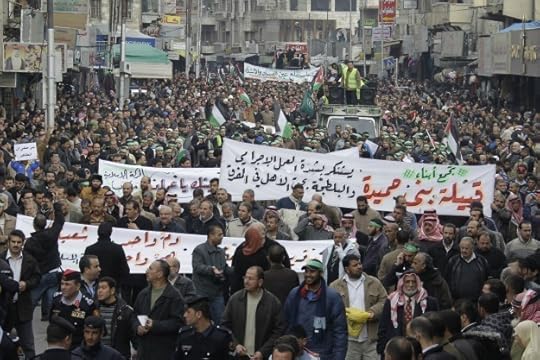
2012 has been a difficult year in the
Middle East in many, painfully familiar ways: descent into civil war in Syria, political polarization and frustration in Egypt, unrepentant repression in Bahrain, war in Gaza, the U.S. Ambassador's death in Libya, stalemate and backsliding in many other countries in the region. But it's been a great year for the Middle East Channel! [[BREAK]]
Over the last twelve months, we have published
more than 250 essays by an impressive range of scholars, journalists and
analysts, and introduced or expanded a number of new initiatives. Subscriptions to our outstanding Daily Brief
have almost doubled in the last year. I
am delighted with the continuing evolution of the Middle East Channel's role as
a premiere source of informed, high-quality analysis of the region's turbulent
politics.
We aim for both breadth and depth on the
Middle East Channel. The top two topics
on the Channel this year, unsurprisingly, were Egypt (20% of all posts) and
Syria (15%). We ran more than ten articles each on Bahrain, Jordan, Libya,
Tunisia, Yemen, and the Arab monarchies of the Gulf, along with extensive
commentary on the Israeli-Palestinian conflict and Iran. We also published outstanding essays on
countries which don't often get attention, such as the fate
of activists in Oman, the ongoing
mobilization in Saudi
Arabia's Eastern Province, the battle
over a Turkish soap opera, and "Morocco's
Resilient Protest Movement."
We also aimed to dive deeper into particular
issues this year by commissioning multiple articles on a similar theme and then
collecting them in the free PDF "POMEPS Briefing" collections. We released a
dozen of these collections in 2012, including "Breaking Bahrain", "Kuwait's Moment of Truth", "The New Salafi Politics", "Morsi's Egypt",
"Jordan, Forever on the Brink", and "The
Arab Monarchy Debate." We also published
an eBook, Islamists in a Changing Middle East.
We also moved into multimedia by introducing
a new series of (mostly) weekly "POMEPS Conversations" with leading Middle East scholars to the video box on the top of the
Channel's home page. Those fifteen
minute chats have been enormously interesting (to me, anyway), with some
focusing tightly on a single political current issue and others ranging widely
across themes, regional trends, or academic debates. The scholars who have joined me for these
conversations recently include Nathan
Brown, Greg
Gause, Wendy
Pearlman, Curt
Ryan, Jillian
Schwedler, Michael
Willis and many others. Subscribe to
the podcast
here and don't miss a convo!
And now, since tradition demands it, a
list. Here are the top posts on the
Middle East Channel this year, based on a highly scientific formula combining
traffic and personal taste. It's hard to
choose, since of course all the pieces we published were my favorite, so when
in doubt I let pageviews and Facebook likes break the ties. Keep in mind that
these articles are drawn only from articles published on the Middle East
Channel, not from the huge variety of great content on the region published
directly by Foreign Policy or on other channels.
The Israeli
Debate on Attacking Iran is Over, by
Shai Feldman (August 20). Foreign
Policy and the Channel ran a lot of articles about the challenges surrounding
the Iranian nuclear program this year.
Feldman intervened at the height of the Iran war fever with this sober
and important analysis of Israel's internal debate, explaining why the Israelis
would not take advantage of the American electoral calendar to strike. Fortunately, he turned out to be right.
Islamism and the Syrian Uprising, by Nir Rosen (March 8). Well before anxieties over the rise of Jubhat
al-Nusra permeated Western discourse on Syria, Nir Rosen wrote this powerful
dispatch about the emerging Islamist role in the uprising. Rosen provided important reporting at a time
when few journalists were able to get access on the ground, pointing to
uncomfortable trends which cut against then-prevailing narratives. The Middle East Channel ran a lot of really
great analysis of the Syrian crisis this year, but Rosen's reported piece stood
out.
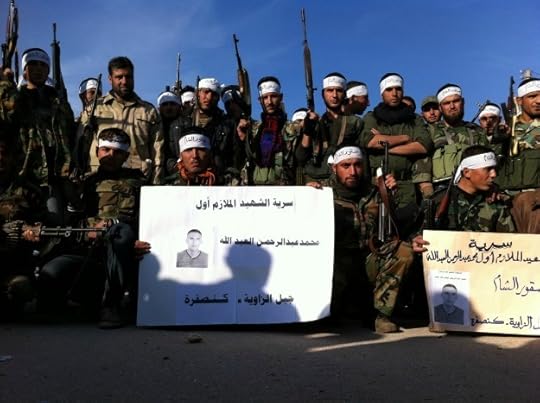
Jordan
is not about to collapse, by Nick Seeley (November 14). Jordanian politics have been moving backward
for years, with the Palace stubbornly refusing to make significant political
concessions to a rapidly growing protest movement. (When protestors took to
downtown Amman in response to fuel price hikes, with some chanting for the
overthrow of the regime, a flurry of
commentary suddenly saw the monarchy on the brink of collapse. Seeley, former editor of JO Magazine and a
long-time Amman-based journalist, thought this was a bit much and explained
exactly why the monarchy was unlikely to rapidly collapse even as it failed to
address its grinding and growing problems.
For now, he was right.
Jordan's
New Politics of Tribal Dissent", by
Sean Yom and Wael al-Khatib (August 7) and "Identity
and Corruption in Jordan's Politics," by Curt Ryan (February 9). It was difficult to decide which of the many other
fantastic articles on Jordan to include, but these two stood out by identifying
vital developments beneath the headlines which have been reshaping the contours
of Jordan's politics. They avoided the sensationalism of impending collapse in
favor of digging deep into the real changes in Jordan's political scene. Richly detailed and analytically
pathbreaking, these articles should be required reading for students of
Jordanian politics this year.
Yes, the Gulf monarchs are in trouble, by Christopher Davidson (November 13). Based on his recently published book After
the Sheikhs, Davidson's article anchored our "The
Arab Monarchy Debate" collection. As
a group, those articles underscored the limitations of monarchy as an
explanation for the patterns of protest and regime survival of the last two
years. Whether or not his predictions
pan out, Davidson has been at the leading edge of identifying the converging
problems facing the Gulf monarchies.
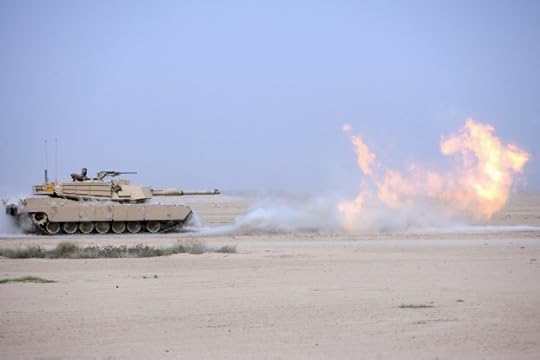
Why the U.S. won't cut military aid to Egypt, by Shana Marshall (February 29). At a time when many policy analysts were
calling on the Obama administration to use its military aid to Egypt as
leverage over its military leaders,
Marshall pointed out exactly why it wouldn't likely happen: most of the money involved went not to
Egyptian generals but to American corporations. This detailed explanation of the unglamorous
realities of such aid programs should have put into sharp perspective the easy
talk of leveraging aid.
The Libyan Rorschach, by Sean Kane; "Militia
politics in Libya's elections" by Jacob Mundy; and "Libya's
volunteer peacekeepers" by William Lawrence.
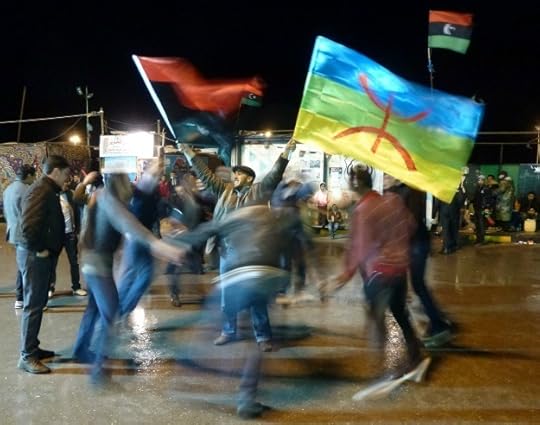
After the horrible death of Ambassador
Christopher Stevens, "Benghazi" became the most important place and issue in
the entire Middle East for certain American political trends. But what happened on that dreadful day only
revealed a small part of the story of post-Qaddafi Libya. A country being rebuilt from a virtual tabula rasa, full of contradicitons and aspirations, deserves far more careful attention than the politicized glances which it usually receives. The Middle East Channel has remained committed to offering ongoing coverage of the new Libya, and these three articles struck us as among the best surveys published this year.
The
Egyptian Republic of Retired Generals, by Zeinab Abul Magd (May 8). The real interests and intentions of the
leaders of Egypt's military dominated Egyptian political debate for over a
year. Abu Magd's post offered a full,
rich account of the economic interests and social place of Egyptian officers
and how they might conceive of their place in a post-SCAF Egypt. Her essay nicely complements two outstanding
essays by Robert Springborg also published this year: "Egypt's
Cobra and Mongoose" and"Egypt's
cobra and mongoose become lion and lamb".
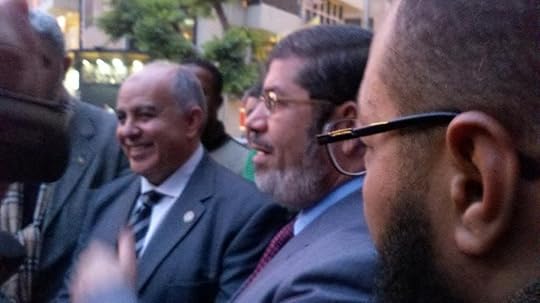
Rethinking
the Muslim Brotherhood and Old
Habits Die Hard, by Khalil el-Anani.
The intentions and the nature of Egypt's Muslim Brotherhood have become
an all-consuming question for many Egyptians and analysts over the last
year. Anani, who has been studying the
Brotherhood intensely for over a decade, offers some of the best perspective on
the internal battles and ideological debates inside Egypt's Muslim
Brotherhood.

Monopolizing
power in Egypt and Morsi's
Majoritarian Mindset by Michael Wahid Hanna. These two essays struck me and our readers as
particularly incisive accounts of the deeper problems with Egypt's transition,
laying bare some of the significant problems with the Muslim Brotherhood's
majoritarian approach to democratic rule.
Among the many other superb essays on Egypt (more than 20% of the total,
remember), I would also recommend "Contesting
Egypt's Future" by Elijah Zarwan; "Cairo's
Judicial Coup" and "Egypt's
State Constitutes Itself" by Nathan Brown; "Can
Egypt Unite?" by Daniel Brumberg; "The
battle for al-Azhar" and "A
better Egyptian constitution" by H.A. Hellyer.
Building
a Yemeni State at the Loss of a Nation by Silvana Toska (October 28). Of the many articles published by the Middle
East Channel on Yemen this year, Toska's stood out for its panoramic view of
the emerging Yemeni state and nation. I
also quite liked Madeleine Wells "Yemen's
Houthi Movement and the Revolution" for its in-depth, on the ground look at
a little understood part of that emerging political landscape.

Calvinball
in Cairo by Marc Lynch. I didn't plan on including any of my own
articles in this list -- and might have preferred this one on the fizzling of Muslim protests against the YouTube video - , but if rules are going to be broken then Calvinball is
the time and place for it! Calvinball
was by far the most read article on the Channel in 2012, I'm happy to say, and remained
relevant all the way up to the end of the year. The absence of fixed rules plagued Egypt's
political transition, driving uncertainty and fear while too often rendering Cairo's
political game absurd.
Why Won't Saudi Arabia Write Down its Laws? By Nathan Brown (January 23). I have no idea why this seemingly obscure
topic proved so irresistable, but Brown's essay on the Saudi legal system remained among the highest pageviews of any article over the course of the entire
year. Go figure.
Thanks to everyone - authors, readers,
tweeters and retweeters, FP editors, Kanye West and all the rest - for contributing to
another great year for the Middle East Channel.
We're looking forward to another great year in 2013!
--
Marc Lynch and Mary Casey
December 29, 2012
Reflections on Egypt's Latest Crisis

With the passage of its controversial constitution through a referendum
marred by low turnout, a deeply dysfunctional process, and bitter
recriminations on all sides, Egypt's latest crisis has finally moved on
to a new stage. This offers an opportunity to take a step back from the
intensity of crisis, the polarized rhetoric, mutual dehumanization and feverish speculation
which has dominated the last month. What has unfolded in Egypt is not a morality play, with good
and evil clashing by night. Now was it the unfolding of an Islamist master plan. This was the worst kind of Calvinball politics: hardball, strategic power plays by
sometimes obtuse and occasionally shrewd actors in a polarized political
environment with no clear rules, unsettled institutions, high stakes, intense mutual mistrust and extremely imperfect
information.
As bad as the last few weeks in Egypt have been, there is a somewhat
optimistic counter-narrative to be told. I have the same sense now that I did this May in my "Egypt's Brilliant Mistakes" post: for all the horrible political decisions on all sides, the stunningly mismanaged transition, and the mandatory mass panic of the analytical community, Egypt still has a chance to muddle through and end up in a pretty decent place by this coming spring. It would not be the worst outcome for a chaotic transition if Egypt emerges in March with a constitution establishing institutional powers and limiting the powers of the Presidency, a democratically elected but weakened President, a Muslim Brotherhood in power but facing unprecedented levels of scrutiny and political opposition, the military back in the barracks, a mobilized and newly relevant political opposition, and a legitimately elected Parliament with a strong
opposition bloc. The costs may have been too high and the process a horror movie, but getting a Constitution in place and Parliamentary elections on the books puts Egypt just a bit closer to that vision. [[BREAK]]
My guarded optimism comes in part from my diagnosis of the problem. For a while now I've been arguing that the core of Egypt's political problem is the institutional vacuum and absence of rules which creates radical uncertainty about the
future. This was the point of my "Calvinball" analogy, of a political game where actors made up the rules as they went along without referee or limits other than the response of other players. This, as Professor Watterson points out above, "lends itself to certain abuses." Morsi's, for instance.
When Morsi made his move in late November, the Presidency was operating in an extremely dangerous
institutional and political vacuum, with no Parliament, no Constitution,
disorganized and fragmented political opposition, a politicized and erratic judiciary, diminishing returns on street mobilization, mounting economic problems,
and rising social and political polarization. An overheated
information environment combined with the effects of this extreme
institutional uncertainty to produce a truly toxic political environment. That's why simply getting a constitution in place, even if it isn't a
perfect constitution, could have significant positive effects. This
would for the first time since the revolution establish the rules of the game, addressing this core
institutional void.
The institutional void inevitably drove polarization and fear. Whether or not the Muslim Brotherhood aspires to
hegemony, Morsi could claim
unchecked power because of the absence of a constitution, the
judiciary's
dissolution of Parliament, and the deficiencies of the opposition. Egyptians had to worry about the possibility that Morsi would
create a
theocracy because there was nothing to definitively prevent him to do
so, and those fears of the possible were fueled by the reckless moves
and rhetoric of a wide range of Islamist figures from the Brotherhood
and beyond.
Morsi's claiming unlimited power did not make it so, however. In the face of popular pressure, he quickly
abandoned his outrageous immunity decree, dropped his controversial new
prosecutor general, and withdrew planned changes to food subsidies in a
matter
of hours. The political opposition is
more relevant and the street more mobilized than it has been for a long
time, while the Brotherhood is under greater popular pressure than ever before. What's more, the crisis rapidly eroded the international goodwill he gained through his mediation of
the Gaza
ceasefire, and has complicated his pursuit of desperately needed
economic
assistance. The costs of this informal pushback -- the dead citizens, the intense social polarization, the lost trust -- were too high, though.
Morsi's appalling decree
granting himself
unchecked powers and his subsequent move to rush through a hastily
completed
Constitution showed poor political judgment. But it isn't as if there
were a better Constitutional process
realistically on offer, given Egypt's
fragmented political class, absence of social consensus or trust, and
horribly mismanaged transition. As valuable as a "good" Constitution
which commanded real consensus might have been, nothing in the record of
the last year
and a half suggests that it was in the cards. Morsi's power grab was
not a particularly "Islamist" one, and the sharp response to his
initiatives demonstrates the limits of his powers more than it shows his
ability to act as some sort of absolute dictator. It may be a
mediocre constitution full of worrying ambiguities, but Egypt has not been remade as either a theocracy or a new dictatorship.
A remarkable number of key constitutional clauses refer back to interpretation by law. I hope that the Shura Council, elected at a time of political exhaustion and apathy, doesn't do anything significant on those before the election and seating of a new Parliament. I also hope that the opposition sticks to its stated plans to form a unified electoral list for those elections, doesn't get sidetracked by debates over boycotting, and is able to convert its political energy into electoral success. Even those who would prefer a boycott should recognize the high stakes. An Islamist
sweep two months from now could allow for some truly alarming
legislative encroachments on personal freedoms and civil rights. But a
strong electoral performance by the opposition could also - finally - create
meaningful checks on Presidential authority for the first time in modern
Egyptian history. The best case here would be that the opposition
can build on the energy of its protests, its newfound unity and the strongly
felt antipathy towards the Muslim Brotherhood, to compete effectively two
months from now in Parliamentary elections. That would position it to legislate more
liberal interpretations of the Constitution, and to block any Presidential
efforts to impose a more autocratic or more Islamist agenda.
Finally, what lessons should be learned about the Muslim Brotherhood from this crisis? The Brotherhood's enthusiastic embrace of quite nasty street politics
and sectarian rhetoric understandably frightened and outraged a wide
swathe of the Egyptian public. But the
crisis has revealed little new about the Muslim Brotherhood's "true nature",
other than that its years in opposition prepared it poorly for the absence of
the political limits which shaped its ideology, strategy, and internal
organization over decades. It suffers from the departure of many key reformist leaders and most creative, driven youth who had been so crucial to the evolution of its political thought and practice in the previous decade. Faced with a radically new political environment and with its conservative wing internally ascendent, the Brotherhood has become
increasingly rigid internally, more high-handed and defensive, and less
willing to compromise or treat its political rivals respectfully. Its decision to seek the
Presidency after promising to not do so continues to be revealed as a great strategic blunder. The mediocre turnout at the constitutional referendum suggests that they will be punished at the ballot
box for these failings -- if their political opponents can work effectively to capitalize on the moment.
I do think that most analysts have read too much about the Brotherhood's ideology into its political behavior over the last month. Just
consider the counter-factual. Morsi's frustration with this stalemated,
overheated political scene would have likely been shared by any other President
who had emerged from that intensely contested June election. A President Shafik or Moussa or Abou el-Fotouh or Baradei would likely have become equally
frustrated with judicial obstruction, failed dialogues, and institutional
paralysis. If, like Morsi, this President had tried to then govern through force d'majeur, it would have (and should have) produced great
concern and condemnation. When Muslim Brothers and Salafis then took to the
streets to denounce liberal overreach and a new Mubarakism and call for a
renewed revolution, their critics in Egypt and abroad would have leaped to
portray this as decisive evidence as the inability of the Brotherhood to accept
democracy. In that counterfactual debate, many shoes would be on different feet.
I realize that this is a perhaps overly optimistic reading of Egyptian politics. I recognize the intensity of the political passions unleashed during this crisis, the legitimate doubts over the intentions of the Brotherhood and the military, and the many possible ways in which things could go horribly wrong. But I also think it's important to visualize a pathway towards a more successful transition. What Egypt needs now is a roadmap towards completing the
Egyptian transition to an instituionalized
democratic system, and to head off the polarization and alienation
rather than
fan the flames. Let's hope that Egypt
can once again muddle through and get there.
December 17, 2012
The 2012 Abu Aardvark Awards

It's time for the 2012 version of my annual list of the Middle East Channel's best books of the year on the Middle East... and, of course, the year's best hip hop albums! Each year, I read through as many books about the Middle East as I can with an eye towards recommending the most thought-provoking, interesting and useful publications of the year (2010 winners here, 2011 here). My own book, The Arab Uprising: The Unfinished Revolutions of the Middle East, is of course ineligible (but for those who care, the paperback is now available and here's a bunch of reviews). Unfortunately for the winners, there's no grandly named award and no cash prize, but at least there's the glory.[[BREAK]]
A few words on the process. As always, it's just me making the list -- no committee, no free books, nobody screening submissions. That means that the selections tend to follow my own interests, and I
probably overlooked or just didn't get into some outstanding books. I made every
effort I could to look at as many potential candidates as possible, and
ended up reading more than fifty eligible books (here's a mostly complete list, though I may have forgotten some or left off those which I only skimmed;
really good late 2012 books which didn't make it onto the pile in time
this year will be eligible for next year's). Reading and rereading them (along with grading) is why I haven't been posting much the last week.
I have a slight bias
towards university press books, though I'm entirely open to well-written
and serious books from other presses. I pay more attention to the Arab
parts of the Middle East than to Iran, Israel or Turkey, and hope
somebody else digs into books on those areas. And I tend to like books
which make me feel that I've actually learned something new --- rich and
unique empirical detail, novel theoretical approaches, unexpected
comparisons. I don't agree with
everything in every b0ok, and none is without flaws. But all provoked me
to think in new ways, taught me new things, held my interest against the allure of Twitter, and challenged my
interpretive frames.
Last year I named two top winners: Stephane Lacroix's Awakening Islam: The Politics of Religious Dissent in Contemporary Saudi Arabia and Wendy Pearlman's Violence, Non-Violence and the Palestinian National Movement, along with a few honorable mentions.
There were a lot of really good books this year, but I didn't think any stood head and
shoulders above the others like in 2011. So instead, this year I have
decided to list ten books in alphabetical order. All are impressive in
their own ways. And so, without further ado, the Middle East Channel's Top Ten Middle East Books for 2012:
Hussein Ali Agrama, Questioning Secularism: Islam, Sovereignty, and the Rule of Law in 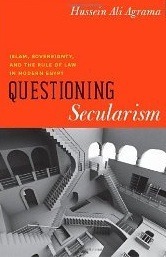 Modern Egypt
Modern Egypt
(Chicago). At a time when Egypt is consumed with debates about the role
of Islam in the constitution and the role of the courts, Agrama's book
offers unique and fascinating insight into the actual operation of
Islamic laws in Egyptian society. While at times a bit distracted by the
jargon of his field, the book finds its stride with a deep reading of the Nasir Hamid
Abu Zayd hisba trial and then breaks genuinely new ground with
its ethnographic examination of the Fatwa Council al-Azhar and Egypt's
personal status courts. Simply fascinating.
Nathan Brown, When Victory is Not an Option (Cornell). How did political competition with the certainty of defeat shape the strategies and ideologies of Muslim Brotherhood political parties?
Completed shortly before victory 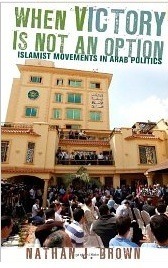 actually became an option for a number
actually became an option for a number
of Arab Islamist political parties, Brown's comparative study will stand
as one of the very best examinations of an era which has passed. He
places Islamist political parties into an effective comparative and
historical perspective, showing well what is unique and what is common
among such political parties. And he shows well how Muslim Brotherhood political parties have adapted to their particular political environments... and anticipates the problems they would face when those political horizons suddenly and dramatically changed. See Brown give a talk about his book here, and my conversation with him about the Egyptian constitution here; among his many Middle East Channel articles are "Egypt's State Constitutes Itself" (November 2012), "Cairo's Judicial Coup" (June 2012) and "Egypt's Transition Imbrogliu" (April 2012).
Christopher Davidson, After the Sheikhs: The Coming Collapse of the Gulf Monarchies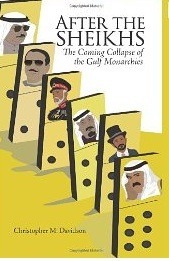 (Columbia/Hurst). Davidson digs deep into the ruling bargain which sustains the Arab monarchies of the Gulf and shows powerfully the mounting challenges they face. It would be easy to get distracted by Davidson's
(Columbia/Hurst). Davidson digs deep into the ruling bargain which sustains the Arab monarchies of the Gulf and shows powerfully the mounting challenges they face. It would be easy to get distracted by Davidson's
provocative prediction of impending turbulence in the states of the Gulf
and miss his careful, rigorous dissection of their historical evolution
and mounting internal and external challenges. This book should be widely debated among those interested in the future stability of these wealthy Gulf states. For Christopher
Davidson on the Middle East Channel, see "Gulf Autocracy in Question" (November 2012)
Ziad Fahmy, Ordinary Egyptians: Creating the Modern Nation Through Popular Culture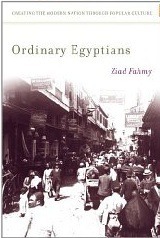 (Stanford). Fahmy's account of the emergence of the Egyptian public
(Stanford). Fahmy's account of the emergence of the Egyptian public
sphere from the 1870s through 1919 is richly detailed, theoretically
sophisticated, and beautifully written. While carefully attuned to the
broader theoretical and historical literature on the public sphere, Fahmy very
effectively shows the contours of a distinctively Egyptian public sphere
and its contribution to the emergence of modern Egypt. This isn't an era of Egyptian cultural history which I knew well, and I roundly appreciated Fahmy's rich and evocative discussion of the changing media landscape and the fields of cultural production.
Bassam Haddad, Business Networks in Syria: The Political Economy of Authoritarian 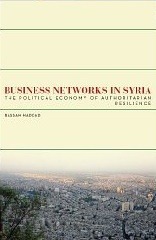 Resilience
Resilience
(Stanford). The uprising of the last two years has exposed the relatively thin state of contemporary scholarship on Syria. In this useful book, Bassam Haddad carefully traces the political and economic
networks which underpinned the regime of Bashar al-Asad, and the
changing political economy of that regime in the decade leading up to
the uprisings. He shows effectively the real distributional and
political impact of economic reforms, the impact of trust deficits and corruption, and the terrain of competing power
centers within Baathist Syria. See Haddad discuss his book at GW here.
Gregory Johnsen, The Last Refuge: Yemen, al-Qaeda, and America's War in Arabia
(W.W. Norton). I've read far too many accounts over the years of
al-Qaeda, Osama bin Laden, and the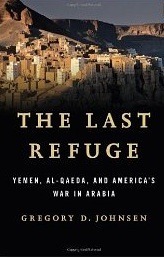 war on terror -- some excellent, but
war on terror -- some excellent, but
too many covering the same familiar ground from a primarily American perspective. Johnsen has produced one of
the few such books to fully incorporate the local into that story by
focusing on Yemen without losing sight of Washington. His Yemeni focus decenters the familiar narratives about al-Qaeda. He has drawn most
attention for his criticism of American reliance on drone strikes, but
his book ranges far more broadly to situate what we now call Al Qaeda in
the Arabian Peninsula into the history of Yemen, Saudi Arabia, and the
broader Middle East. For Gregory Johnsen on Foreign Policy, see "Ignoring Yemen at Our Peril" (December 2010) and "Losing Yemen" (November 2012).
Hazem Kandil, Soldiers, Spies and Statesmen: Egypt's Road to Revolt (Verso).
An entertaining 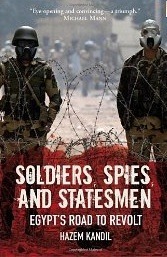 and challenging historical narrative of Egypt from
and challenging historical narrative of Egypt from
Nasser's revolution to the year following the January 25 revolution.
Kandil gives an often gripping historical narrative which is both
theoretically informed and full of fascinating details drawn from a wide
range of Egyptian and archival sources. Some of the historical judgments could be challenged, but the debate would surely be an informative one. Refreshingly, his account focuses more on
the machinations of the officer corps and the political class, and on a
changing political economy, than on the Muslim Brotherhood. The dissection of the institutional battles between the military, security services, state institutions, Presidency and political class offer fascinating perspective on today's tortuous Cairo politics.
Daniel Kurtzer, Scott Lasensky, Steven Spiegel, Shibley Telhami and William Quandt, The Peace Puzzle: America's Quest for Arab-Israeli Peace, 1989-2011
(Cornell). Close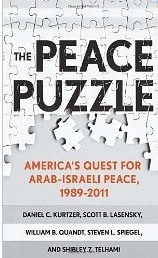 to the final word on the American perspective on the
to the final word on the American perspective on the
diplomatic history of the peace process, with five deeply experienced
authors who conducted hundreds of interviews with nearly all the
participants. The Peace Puzzle corrects the historical record
repeatedly, particularly the distortions which have emerged through
memoirs and entrenched journalistic narratives. While it will not
satisfy those who would prefer to see more attention to the lived
experience of Israelis, Palestinians or other Arabs, it covers its
chosen terrain of diplomatic history extremely well. I only wish I
could share the optimistic view of the authors that a record of nearly
constant failure over multiple administrations suggests only that
different tactics might have succeeded.. or might yet succeed.
Laurence Louer, Shiism and Politics in the Middle East (Columbia/Hurst). An extremely useful guide to the politics of Shia networks in today's Middle East. This slim volume 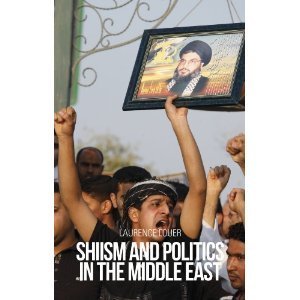 could use a bit more focus and a bit more depth (of the sort found in 2008's Transnational Shia Politics,
could use a bit more focus and a bit more depth (of the sort found in 2008's Transnational Shia Politics,
by the same author). But its sharp explanation of the role of specific
Shia networks across the Middle East offers genuinely eye-opening
insights into the nature of political and intellectual influence across
these Shia communities. It helps to make sense not only of Bahrain, but
of Iraq, Saudi Arabia, Iran, Lebanon and beyond.
Joseph Sassoon, Saddam Hussein's Baath Party: Inside an Authoritarian Regime (Cambridge). Sassoon draws on enormous volumes of Iraqi documents and audiotapes seized after 2003 to 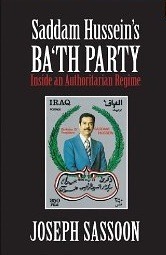 reconstruct the organization of Saddam Hussein's Iraq. The result of this unprecedented archival research is a painstaking, understated but powerful demonstration of the logic of an authoritarian state from the inside. With this new documentary access into the inner workings of the Iraqi security state, Sassoon' book begins to fill in one of the massive missing pieces in the historiography and analysis of the politics of the Middle East.
reconstruct the organization of Saddam Hussein's Iraq. The result of this unprecedented archival research is a painstaking, understated but powerful demonstration of the logic of an authoritarian state from the inside. With this new documentary access into the inner workings of the Iraqi security state, Sassoon' book begins to fill in one of the massive missing pieces in the historiography and analysis of the politics of the Middle East.
Congratulations to all of these outstanding colleagues for writing such outstanding books. Reading work like this reminds me of why I'm so proud to be part of the Middle East Studies intellectual community.
And.... there's of course another tradition here: the best hip hop
albums of the year! And for the first year in the history of the
awards, the winner isn't going to include Kanye West or Jay-Z. Cruel
Summer had some truly great songs (including "New God Flow", with Pusha T
and Ghostface Killah, my nominee for song of the year), but just didn't
add up to a complete album. A number of other albums with great
potential had bright flashes but ultimatedly didn't quite cut it: Nas, Life is Good (can't get past the Jay Electronica ghostwriting allegations); Lupe Fiasco, Food and Liquor II (amazing in places but too preachy); Slaughterhouse, Welcome to Our House
(brilliant at times, but repetitive and too many dud tracks); Game's Jesus Piece (too erratic); Big Boi's Vicious Lies and Dangerous Rumors (great fun though).
Two albums were simply brilliant, and probably would have won in another year. Kendrick Lamar's good kid, MAAD city and Big KRIT's Live from the Underground were
each lyrically  complex, musically distinctive, and true to a unique
complex, musically distinctive, and true to a unique
musical vision. These two intelligent, spirited and experimental young
rappers, like J.Cole last year (hear all three together here), point to the bright future of hip hop
beyond the exhausted gangsters and the tiresome club bangers. I loved these two albums and can't wait to hear more from these two incredibly talented young lyricists.
But the album of the year is the one that has stayed on the top of my iPod since the spring: Strange Clouds
by B.o.B. Nothing else out there could match it for its insane
energy, lyrical wordplay, sheer fun, honesty, and dazzling motion.
Watch "Play for Keeps", "Both of Us" (with Taylor Swift), and "So Good", but stay away from the Nicki Minaj trainwreck "Out of My Mind," the album's only dud.

And so there you have it: B.o.B. not only got to perform for President Obama, open for Jay-Z and Eminem, and win the 2012 People's Choice Awards -- he also gets this year's nod for the coveted Abu Aardvark's 2012 Album of
the Year. Way to go Bobby Ray!
December 16, 2012
The Arab Monarchy Debate

It has been widely noted that monarchies have done better at
surviving the Arab uprisings that began two years ago. Three Presidents (Ben
Ali, Mubarak, and Saleh) have fallen, along with Muammar al-Qaddafi's unique Jamahiriaya, while Bashar al-Assad's
Baathist presidential regime faces a mortal threat. No Arab monarch has yet lost his throne. For some analysts and
academics, this pattern suggests a fairly obvious "monarchical exception" which
demands explanation.
In August, I launched a debate on Foreign Policy about whether and
how monarchy matters in explaining the resilience of Arab regimes. I was
not impressed. Against arguments that monarchies possess
some kind of unique legitimacy commanding the loyalty of their people, I noted
that Arab monarchies have in fact faced significant popular mobilization
over the last two years: Bahrain has had one of the most intense and protracted
uprisings anywhere; Kuwait is facing the deepest political crisis in its
post-occupation history; Jordan experienced unprecedented protests; Saudi
Arabia has had a protracted challenge in its Eastern Province; Oman experienced
unusual levels of protest; Morocco's protest movement drove the king to adopt a
significant (if underwhelming) constitutional initiative. I concluded, "the
monarchies look like fairly typical Arab authoritarian regimes, surviving
because they enjoy greater financial resources, less demanding international
allies, and powerful media assets to perpetuate their legitimation myths."
The responses I got over email, over Twitter, across blogs,
and at various academic conferences convinced me that the monarchy question
remains an open one, however. It is an important debate for political
scientists and analysts, with a wide range of arguments and evidence to
consider. Over the last few months, I have reached out to a number of leading
scholars to weigh in on the question of Arab monarchy. I asked them to move
beyond simple binaries ("monarchy does or doesn't matter") to explore the
specific mechanisms by which it might matter, to weigh them against competing
explanations, and to show how monarchy operated in particular cases which they
knew well. Those articles, along with some particularly relevant older Middle
East Channel essays, are now collected in today's new POMEPS Brief, "The Arab
Monarchy Debate."[[BREAK]]
The debate is an interesting one. Daniel Brumberg pushes us
to focus on how different regime types might have comparative advantages in the
specific "sustaining
mechanisms" of Arab autocrats. Michael Herb makes a guarded case for the distinctive
resilience of family monarchies, a unique mechanism for leadership
selection explored
as well by Gregory Gause. Sean Yom points instead to money, security
forces, and foreign patrons, which the monarchies enjoy for reasons that have little
to do with monarchy. If these more material explanations are correct, then
the monarchs may be in for a rough ride, as Christopher
Davidson argues, since many of those assets are wasting ones. In particular,
the economic
commitments made to ride out the storm may not be sustainable, Steffen
Hertog notes.
What about specific countries? Recent POMEPS Briefs have
looked in depth at the situations in Jordan,
Bahrain, and Kuwait.
This collection adds several reflections on Saudi Arabia (by Madawi
al-Rasheed, Stephane
Lacroix, and Toby
Matthiessen); Oman (Ra'id
Al-Jamali); Jordan (Nicholas
Seeley); and Morocco (Mohamed
Daadoui). These closer looks are particularly helpful at identifying the
differences in the nature of monarchy across the region: Jordan's monarchy simply
operates differently, is viewed differently across society, and has a different
set of sustaining mechanisms compared to the ruling families in Saudi Arabia,
Qatar, or Kuwait. Monarchs with parliaments have different political horizons
than those who rule without elected bodies. For instance, those monarchs with
small populations and virtually unlimited financial resources don't seem to
have that much in common with their larger and poorer cousins.
It would be foolish to deny the observable reality that thus
far all the Arab monarchs have survived where other regime types have failed. But
that has to be a starting point, not a conclusion. From a political science
perspective, that should force us to look harder at the specific mechanisms of
control, which may or may not sustain specific monarchs in the future. Belief
in a "monarchical exception" is useful for the monarchs in their efforts to
deflect domestic challenges, reduce expectations of potential change, and
maintain international support. It may also contribute to a certain complacency
among their foreign allies, who may be relieved at not seeing the need to plan
for the possible loss or transformation of such useful partners. I hope that
this collection of essays helps to advance this important ongoing debate. Download POMEPS
Brief #16 "The Arab Monarchies Debate."
December 11, 2012
The Land of Topless Minarets and Headless Little Girls - By Amal Hanano
Marc Lynch's Blog
- Marc Lynch's profile
- 21 followers



